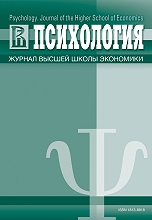Fables Comprehension in Healthy Adults: Does IQ Matter?
Abstract
Understanding ambiguous texts has been widely accepted as an indicator of conceptual thinking efficiency. As a kind of ambiguous texts, fables are promising as a tool for measuring cognitive abilities, but rarely used in intelligence research. In this study, we aimed to reveal: 1) the degree to which healthy adults experience difficulties in fables comprehension; 2) the role that psychometric IQ plays in understanding fables’ metaphorical meanings (gists). We hypothesized that: 1) the higher the level of psychometric IQ, the better the understanding of fables’ gists; 2) the higher the level of fables understanding, the higher the ability to pair single fables in accordance to their gists. Twenty-four participants were presented with 3 sets of Aesop’s fables and an IQ test. During in-depth interviews, they were asked to interpret the gist of each fable and pair any two of them within each set. It was shown that healthy adults experience major difficulties with understanding fables’ gists at a highly generalized, abstract level. We found no correlation of psychometric IQ and fables understanding; and no correlation between comprehension depth and fables pairing. This suggests that 1) there is a lack of conceptual thinking in healthy adults and 2) the ability to understand a fable’s gist is not reflected in the results of current psychometric tools but may require more advanced approaches.
Downloads
References
2. Avanesyan, M. O. (2013). Psikhologicheskie mekhanizmy ponimaniya i sozdaniya metafory [Psychological mechanisms of metaphor comprehension and creation] (Extended abstract of PhD dissertation). Saint Petersburg State University, Saint Petersburg, Russian Federation. (in Russian)
3. Chia, K. (1995). What’s the point? Children’s understanding of didactic stories. Singapore Journal of Education, 15(1), 48-58.
4. Erickson, M. H. (1991). My voice will go with you: The teaching tales of Milton H. Erickson. New York: W.W. Norton & Company.
5. Ivanova, E. M. (2007). Narusheniya chuvstva yumora pri shizofrenii i affektivnykh rasstroistvakh [Analysis of disfunctions of the sense of humor in schizophrenia and affective disorders] (Extended abstract of PhD dissertation). Retrieved from http://www.psy.msu.ru/science/autoref/ivanova.pdf (in Russian)
6. Iwuji, S. O. (2014). Development of moral didacticism in children: A cross-cultural study. Theses, Dissertations and Capstones, paper 862.2014. Retrieved from http://mds.marshall.edu/cgi/viewcontent.cgi?article=1867&context=etd
7. Magder, D. (1980). The Wizard of Oz. A parable of brief psychotherapy. Canadian Journal of Psychiatry/Revue Canadienne de Psychiatrie, 25(7), 564-568.
8. Narvaez, D., Bentley, J., Gleason, T., & Samuels, J. (1998). Moral theme comprehension in third graders, fifth graders, and college students. Reading Psychology, 19, 217-241. https://doi.org/10.1080/0270271980190203
9. Nikiforova, E. A., & Shcherbakova, O. V. (2017). Ponimanie mnogoznachnykh tekstov v norme i u patsientov s nevroticheskimi rasstroistvami [Comprehension of dual-meaning texts in healthy adults and patients with neurotic disorders]. In O. V. Zashchirinskaya & A. V. Shaboltas (Eds.), Psykhologiya 21 veka: sistemnyi podkhod i mezhdisciplinarnye issledovaniya. Sbornik nauchnykh trudov uchastnikov mezhdunarodnoy konferentsii molodykh uchenykh [Psychology of the 21st Century: a systematic approach and interdisciplinary research. A collection of proceedings of the participants at the International Conference of Young Scientists] (Vol. 2, pp. 135-141). Saint Petersburg: Skifiya-print. (in Russian)
10. Pearce, S. S. (1996). Flash of insight: Metaphor and narrative in therapy. Boston: Allyn & Bacon.
11. Peseschkian, N. (2012). Oriental stories as tools in psychotherapy: The merchant and the parrot. New York: Springer Science and Business Media.
12. Piaget, J. (1951). The psychology of intelligence. London: Routledge and Kegan Paul.
13. Raven, J. (2000). The Raven’s progressive matrices: change and stability over culture and time. Cognitive Psychology, 41(1), 1-48.
14. Raven, J. C. (2002). Standartnye progressivnye matritsy: (Vklyuchaya parallel’nye i Plyus versii) [Raven’s Standard Progressive Matrices (parallel form)]. Moscow: Kogito-Center. (in Russian)
15. Shcherbakova, O. V. (2008). Fenomen ponimaniya kak intrapsikhicheskii mezh”yazykovoi obratimyi perevod (na primere komicheskikh tekstov) [Comprehension as an Intrapsychic Interlanguage Reversible Converting (on the Material of Comic Texts)]. Vestnik of Saint Petersburg University. Series 12. Sociology, 4, 215-225. (in Russian)
16. Shcherbakova, O. V. (2009). Kognitivnye mekhanizmy ponimaniya komicheskogo [Cognitive mechanisms underlying comprehension of comic material] (Extended abstract of PhD dissertation). Saint Petersburg State University, Saint Petersburg, Russian Federation. (in Russian)
17. Shcherbakova, O. V., & Makarova, D. N. (2016). Are they different or the same? Experts’ psychometric IQ does not correlate with conceptual abilities. Vestnik of Saint Petersburg University. Series 16. Psychology. Education, 4, 88-96. https://doi.org/10.21638/11701/spbu16.2016.407
18. Shcherbakova, O. V., & Nikiforova, E. A. (2016). Rol’ IQ i kontseptual’nykh sposobnostei v ponimanii perenosnogo smysla verbal’nykh tekstov [The role of IQ and conceptual abilities in comprehension of verbal texts with metaphorical sense]. In Ananyevskiye chteniya -2016: Psykhologiya: chera, segodnya, zavtra: materialy mezhdunarodnoy nauchnoy conferencii, 25-29 October 2016 [Ananyevskiye readings -2016: Psychology yesterday, today, tomorrow: materials of the International Scientific Conference] (Vol. 2, pp. 120-121). Saint Petersburg: Aising.
19. Townsend, G. F. (2006). Aesop’s Fables. http://ReadHowYouWant.com.
20. Vekker, L. M. (1976). Psikhicheskie protsessy [Mental processes] (Vol. 2). Leningrad: Leningrad State University. (in Russian)
21. Vygotsky, L. S. (2002). Myshlenie i rech’ [Thinking and speech]. In L. S. Vygotsky, Psikhologiya [Psychology] (pp. 262-511). Moscow: EKSMO-press. (in Russian)
22. Zeigarnik, B. V. (1962). Patologiya myshleniya [The pathology of thinking]. Moscow: Moscow University Press. (in Russian)





